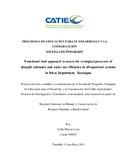Functional trait approach to assess the ecological processes of drought tolerance and water use efficiency in silvopastoral systems in Rivas Department, Nicaragua

View/
Date
2011Author
Olivero Lora, S.
Autor Corporativo
CATIE - Centro Agronómico Tropical de Investigación y Enseñanza
Type
Tesis de maestría
Metadata
Show full item recordDescription
Tesis (Mag.Sc.) -- CATIE, 2011
Abstract
El propósito de este trabajo fue evaluar el potencial de la ecología funcional como una alternativa para responder a necesidades específicas de manejo dirigidas a garantizar el aprovisionamiento de servicios ecosistémicos en agroecosistemas áridos de Rivas, poder predecir o mejorar la capacidad funcional de agroecosistemas para soportar el cambio climático, y de forma mas específica, la contribución de las especies para asegurar la producción de biomasa a traves del año. El análisis de componentes principales mostró una clara separación de especies basada en las clasificaciones tradicionales de tolerancia-evasión vs. un eje relacionado a uso de recursos (conservador-adquisitivas). Nuestros resultados sugieren no solo que hay rasgos específicos asociados a las respuestas de estrés climático, si no también que estos rasgos manifestados en las especies proveen diferentes efectos para la mitigación de sequía a través de la prevención de pérdida de agua bajo la copa. Se recomiendan las especies G. ulmifolia y C. alala para mejorar el aprovisionamiento de servicios ecosistémicos de tolerancia a sequía, conservación de agua y producción de pasto. The purpose of was to evaluate the potential of functional ecology as an alternative to respond to specific management needs aimed at guaranteeing the provision of ecosystem services in semiarid agroecosystems of Rivas, to be able to predict or improve the functional capacity of agroecosystems to support climate variability, and more specifically, the contribution of the species to assure biomass production through the year. Our finding suggest not only that there are specific traits associated with responses to climatic stress, but also that this traits manifested in species provide different effects to drought mitigation by preventing understory water loss. We measured actual evaporation under the different canopies trees in relation to the differentiation of the ability of the species to conserve humidity during the end of the drought period. We recommend the species G. ulmifolia and C. alata to improve provisioning of ecosystem services of drought resistance and pasture production as they prove to have well defined different drought responses, prevent a significant amount of evapotranspiration under their canopies during the dry season, and allow enough light transmission to reach the understory to guarantee pasture production.
Keywords
Delegation
Sede Central
Asesor
Clerck, F. de
Publisher
CATIE, Turrialba (Costa Rica)
URI (Permanet link to cite or share this item)
https://repositorio.catie.ac.cr/handle/11554/2206Collections
- Tesis [574]

